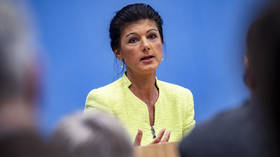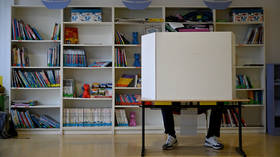New German ‘peace party’ already third most popular – poll

A new German political party – the brainchild of prominent Left Party MP Sahra Wagenknecht, and which is yet to take form – has already overtaken a member of the ruling coalition government, a poll commissioned by the Bild am Sonntag media outlet has indicated. Wagenknecht is a vocal critic of Chancellor Olaf Scholz’s cabinet and its policies regarding the conflict between Russia and Ukraine.
In a report on Saturday, Bild am Sonntag cited two surveys conducted over the course of the week – one which features the so far nameless organization, and another that does not. The media outlet attempted to deduce which existing parties will lose supporters to their would-be rival.
Wagenknecht announced her plans at a press conference on Monday, saying that she expects the new party to officially come into being in early 2024.
However, according to one of the polls mentioned above, around 14% of Germans would already vote for the party, putting it in fourth place. Scholz’s Social Democratic Party is just one percentage point ahead, while the other two members of the ruling coalition, the Green Party and the Free Democrats, lag behind Wagenknecht’s dark horse, with 12% and 5% respectively.
The polls suggest that the party that would shed the highest number of voters if the new group enters the political landscape would be the far-right Alternative for Germany Party (AFD). As things stand, 21% of Germans would vote for the AFD; however, if presented with the Wagenknecht option, 4% would change sides. The new party also seems likely to attract voters who would otherwise back smaller parties that are not represented in the German parliament.
Speaking at the press conference on Monday, Wagenknecht expressed hope that her party will run candidates in regional elections in the eastern regions of Saxony, Thuringia, and Brandenburg, as well as in the European Parliament election next year. Explaining the need for a new party, she argued that things “can’t continue like this” or Germans “will probably not recognize our country in ten years.”
Wagenknecht said the party will seek to preserve Germany’s “economic strengths” while working towards social justice. With respect to foreign policy, Berlin should use diplomacy rather than weapon deliveries when dealing with conflicts, she added.
She has been a vocal critic of Scholz’s policies toward Russia regarding the Ukraine conflict, as well as the EU’s sanctions on Moscow, which she says are useless.













